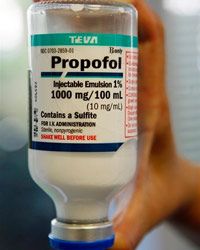According to the autopsy report, yes, Michael Jackson's death is considered a homicide, and Dr. Conrad Murray, Jackson's private physician, is being charged with involuntary manslaughter.
Here's how the determination breaks down.
First, based on the results of the autopsy, the coroner couldn't determine a medical need for propofol to be administered to Jackson. It was then determined that the propofol was injected by someone other than Jackson himself, which rules out suicide.
Additionally, the manner in which the propofol was administered was questionable: The doctor who injected Jackson with the drug didn't follow the proper procedures. The physician, Murray, treated Jackson in Jackson's home rather than in a hospital setting. There was no equipment for monitoring Jackson while he was under the influence of the drug, no equipment to resuscitate him if there was a problem during his sedation and no supplies to ensure the proper dosage was administered.

